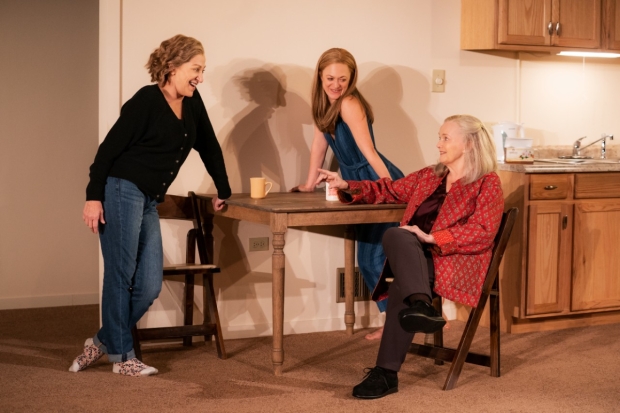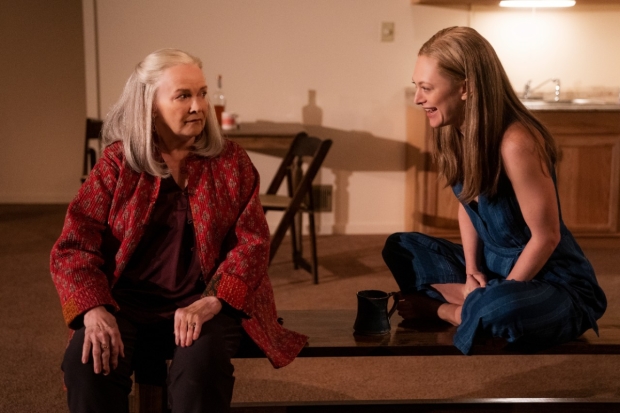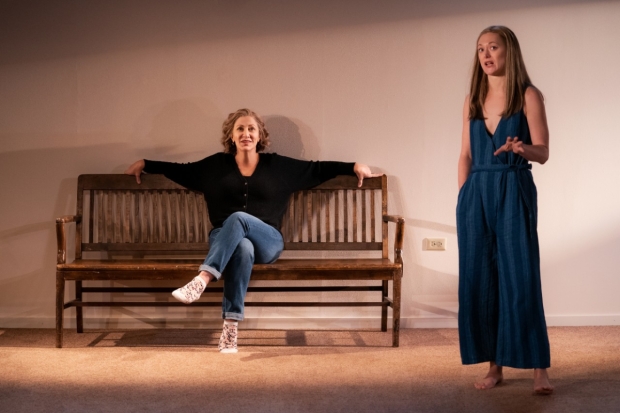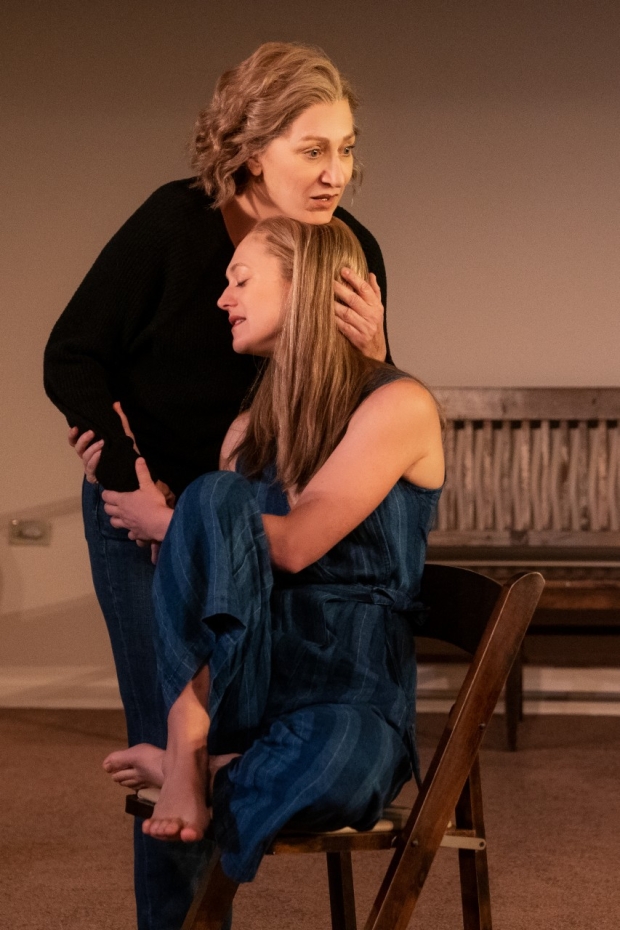Review: Morning Sun Is a Work of Art With No Regrets
Edie Falco, Blair Brown, and Marin Ireland play three generations of a New York City family in this new play by Simon Stephens.

(© Matthew Murphy)
A lot of playwrights are poets, but not many are craftsmen like Simon Stephens, author of The Curious Incident of the Dog in the Night-Time and the delicate two-hander Heisenberg. His new play, Morning Sun, is now running at New York City Center as part of Manhattan Theatre Club's off-Broadway season, and it is a master class in theatrical precision.
In just about 90 minutes with only three actors, a sparsely furnished room (a brown and beige no-man's land designed by dots), and few intrusive embellishments from the light and sound booths (lighting by Lap Chi Chu and sound by Lee Kinney and Daniel Kluger), Stephens delivers a piece with so many rich particulars that it evokes countless universals. Looking down the barrel of the last American century, he picks apart the evolving ideas of identity, family, memory, isolation, femininity, art — even ghost stories, which he suggests may be what New Yorkers are really telling every time they mourn the loss of their favorite pizza joint.
Intentional or not, Morning Sun shares genetic material with Edward Albee's Three Tall Women. While Albee's abstract piece manifests one woman at three different ages reflecting on the highs and lows of life, Stephens draws women from three generations of a family, each taking us through her own story and arguing with the woman to her left and right about the truest version of these personal yarns, and what, if anything, should be regretted.
But of course, when it comes to memory, what is truth? And where can you even say a mother's story ends and a daughter's begins? Stephens draws no concrete boundaries — nor does director Lila Neugebauer, who deftly maneuvers a piece that is so much about storytelling, but leaves the audience in a constant state of uncertainty about the reliability of the narrators, their reasons for detailing their history, and the mysteriously liminal realm from which they're speaking to us and one another.

(© Matthew Murphy)
Morning Sun's three (medium-size) women are matriarch Claudette McBride (Blair Brown), her daughter Charley (Edie Falco), and Charley's daughter Tess (Marin Ireland). Claudette, born in the upstate town of Nyack, New York, in the 1920s, is the keeper of the McBride family's grand origin story: At 20 years old, she moved to Manhattan and landed a two-bedroom, rent-controlled, 5th floor walk-up in Greenwich Village. Little does she know, this will become the comforting home base around which her daughter's and granddaughter's lives will center, even as New York City endures its many trials and tragedies over the ensuing decades.
New York City becomes the fourth character in Stephens's play, evoking the Edward Hopper painting that inspired the title and that creeps into the story every so often (Hopper shares Claudette's hometown of Nyack, and Charley meets one of her most significant romantic partners while viewing "Morning Sun" at a museum). The 1952 painting is known as a meditation on the isolation of urban life: A woman blankly stares out her bedroom window onto a distant and impersonal cityscape. The New York City that Stephens draws in his play is neither distant nor impersonal, but it certainly is shaped by the eyes of the women gazing out upon it — particularly Charley, who we're told mid-play is the true owner and subject of this story.
As our lodestar, Falco is the only member of the trio to play the same character throughout — Ireland and Brown slip into and out of other characters who have played leading roles in Charley's life. With these shadows swirling around her, she meditates on the parallel stories of Manhattan and her own past while also standing apart from them, mirroring the iconic woman in Hopper's painting. Falco's performance conveys that fine balance of satisfaction, self-delusion, and disquietude that so often form the combustible stew of self-reflection. After all, stuck inside her own mind looking out, some of the pictures she sees nag at her conscience, while others look beautiful in the light of a new day.

(© Matthew Murphy)
As her daughter Tess, Ireland embodies the object of maternal infatuation as well as frustration as a New School student of the '90s looking for satisfaction in her career (as opposed to the stability Charley found fulfilling in her job as a hospital receptionist). Ireland also strikes a few haunting figures, taking on the parts of Charley's former best friend who disapproved of her single motherhood and an abusive boyfriend whom Charley tries to frame in a more positive light. As Claudette, Brown cuts with her judgments in ways only a mother can. And yet, she also beautifully embodies the ghosts of some of Charley's most beloved companions: Her playful Uncle Stanley who intrigues her with ghost stories and her late-life partner Eddy (another nod to Hopper) who gives her that ever-elusive sense of safety.
"Safety," a glaring presence or absence in a person's life, is one of the most interesting ideas Stephens interrogates throughout Morning Sun through the angles of both family and city dwelling. Between the violent Weathermen of the 1960s, the AIDS epidemic of the 1980s, and the World Trade Center attacks on 9/11, New York on paper is a city of danger. And yet, in the McBrides' Greenwich Village walk-up, there is a feeling of safety. We see Charley debate with her contrarian mother on this point — perhaps an argument they once truly had, or merely a conversation Charley imagines, knowing in the rational part of her mind that neither her family nor her city were always safe. "It feels true," she says in defense of her personal narrative. "That's what matters."

(© Matthew Murphy)








